OY VEY
A barrage of human suffering — anti-Semitism, racism, anti-Muslim hostility, misogyny, LGBT closets, slavery, Japanese-American internment camps, miscarriages, PTSD, death, and a literal onstage kitchen sink — are given the holiday treatment in Jennifer Maisel’s Hanukkah-inspired Eight Nights. Highlighting eight not-so-festive nights over eight decades in the life of Holocaust survivor Rebecca Blum, this world premiere is one of two new plays (alongside Stephanie Alison Walker’s The Abuelas) at least partially developed in the Antaeus Playwrights Lab. Known for producing successful classics, Antaeus Theatre Company is taking a risk this season showcasing for the first time two internally-developed works that, unlike most of their productions, have not stood the test of time — a test this obvious indulgence is unlikely to pass.
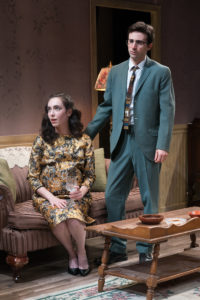 Before our shell-shocked protagonist utters her first line she’s already won our sympathy. Having just arrived at a dingy Lower East Side Manhattan apartment to live with her father (Arye Gross) — a German Jewish refugee with whom, after a forced separation, she’s been reunited — a young Rebecca Blum (Zoe Yale) is visibly traumatized: eyes wide in horror, hands clinging to her luggage. It is in this tenement where she’ll spend her life plagued by her horrific past.
Before our shell-shocked protagonist utters her first line she’s already won our sympathy. Having just arrived at a dingy Lower East Side Manhattan apartment to live with her father (Arye Gross) — a German Jewish refugee with whom, after a forced separation, she’s been reunited — a young Rebecca Blum (Zoe Yale) is visibly traumatized: eyes wide in horror, hands clinging to her luggage. It is in this tenement where she’ll spend her life plagued by her horrific past.
While the playwright eschews a more engaging story of a survivor’s journey through trauma for an avalanche of polemics about it, Maisel can’t be faulted for not putting her own stamp on the Holocaust story. Spanning 1949-2016 (each scene approximately a decade apart), Eight Nights explores the effects of trauma over a lifetime, beginning with Nazis and culminating with the election of Donald J. Trump. It makes abundantly clear the dangers of repeating history, if too obvious in its delivery. This epic approach is not without its trappings. Because we only get to peek in at Rebecca (Tessa Auberjonois, in her older years) every ten years or so, it’s hard to know her intimately. Also, what’s curated from these 67 years, bogged down with an exhaustive social justice agenda, is so artificial it defies believability.
With the growing demand for theaters to produce works that represent diverse voices and employ artists who’ve long been overlooked, playwrights and companies alike are stepping up to the plate. However, Eight Nights, directed by longtime Antaean Emily Chase, is more an exercise in “woke” virtue signaling than it is effective storytelling. While people of color are specifically written into the script — two black, one mixed-race (Japanese/White) — their characters’ familial experiences with oppression are awkwardly stacked against those of a straight, white Jewish woman whose status as a Holocaust survivor takes focus and precedence.
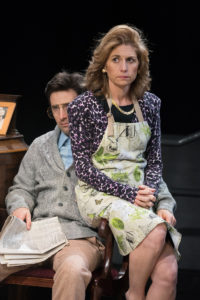 In a scene where Rebecca is discussing with her black best friend and business partner, Arlene (Karen Malina White), about the mistreatment of women in the workforce, Rebecca posits the reason Arlene doesn’t get too hands-on in their business is because she doesn’t like dealing with white people — even though Rebecca is white. To which Arlene replies, “somehow you don’t qualify.” You see, Rebecca is that open-minded “exception to the rule” that supporting characters (African-American, mixed-race, Muslim, LGBT-identifying, etc.) are written into the script to revere; a character who also uses their unique histories of oppression to amplify her own. But this unnecessary comparing/contrasting of a litany of injustices — experiences Rebecca occasionally insists aren’t the same — not only bogs down what could have been a singularly-focused narrative to achieve universal appeal, it forces a ridiculous competition amongst put-upon groups. (An Oppression Olympics, if you will.) And this is where “diversity theater” becomes less about honoring marginalized voices and more about making its creators and audiences feel good — seeing themselves in the starring role of the victimized “Do-Gooder.”
In a scene where Rebecca is discussing with her black best friend and business partner, Arlene (Karen Malina White), about the mistreatment of women in the workforce, Rebecca posits the reason Arlene doesn’t get too hands-on in their business is because she doesn’t like dealing with white people — even though Rebecca is white. To which Arlene replies, “somehow you don’t qualify.” You see, Rebecca is that open-minded “exception to the rule” that supporting characters (African-American, mixed-race, Muslim, LGBT-identifying, etc.) are written into the script to revere; a character who also uses their unique histories of oppression to amplify her own. But this unnecessary comparing/contrasting of a litany of injustices — experiences Rebecca occasionally insists aren’t the same — not only bogs down what could have been a singularly-focused narrative to achieve universal appeal, it forces a ridiculous competition amongst put-upon groups. (An Oppression Olympics, if you will.) And this is where “diversity theater” becomes less about honoring marginalized voices and more about making its creators and audiences feel good — seeing themselves in the starring role of the victimized “Do-Gooder.”
Eight Nights does work in one aspect: its power as a ghost story. Not only does it deal with the ghosts that haunt victims’ minds, it literalizes ghosts of those who’ve passed. The dead sit on chairs or roam the stage quietly observing the living. Equally as stirring is the play’s haunting lighting and sound design (Karyn D. Lawrence and Jeff Gardner, respectively). During transitions between the decades, lights dim and music fills the theater with a pronounced echo, as if becoming a distant memory. Actors move across Edward E. Haynes, Jr.’s bleak set like poetry. Such haunting elements culminate to great effect in the play’s final moments.
The ensemble of actors (which includes Devin Kawaoka, Christopher Watson, Zoe Yale, and Josh Zuckerman) delivers mostly good work. While verbal fight scenes are directed to be more aggressive than necessary, most performers are able to distinguish their multiple roles with depth and nuance. Auberjonois as the older Rebecca is a particular standout, showing the pain of a woman who can’t find peace of mind even as she begins to open up. However, Gross as Rebecca’s father is puzzling in the opening scene. It’s hard to understand his seeming nonchalance as he’s reunited with his daughter (Yale), whose own portrayed fear — standing silently for minutes, unable to move, during his extended monologue — feels exaggerated, even considering her circumstances.
Collective trauma is certainly dark material for a play set during the celebratory Festival of Lights, yet fitting in its hopes of overcoming oppression. Despite setting itself up for easy wins through atrocities and shared humanity, it’s surprisingly lacking in its ability to genuinely move us. While its ending packs the most punch, the play’s distracted focus leaves us wondering what the point is beyond a “Rebecca Blum, This Is Your Life” retrospective filled with a forced cast of characters. The irony of an elderly Rebecca’s objections to the current generation’s need to wear their ancestor’s trauma like a badge of honor seems lost on a play that essentially does the same.
Eight Nights
Antaeus Theatre Company
Gindler Performing Arts Center
110 East Broadway in Glendale
Fri and Sat at 8; Sun at 2; Mon at 8
(check first for exceptions)
ends on December 16, 2019
for tickets, call 818.506.1983 or visit Antaeus
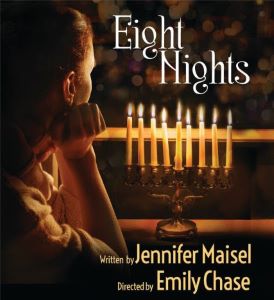
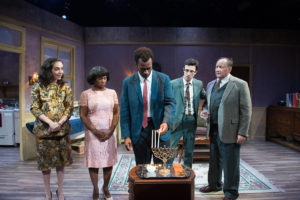
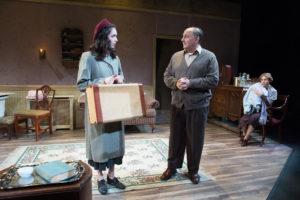
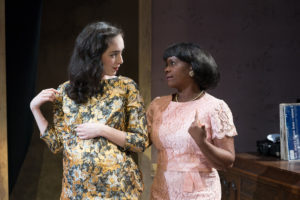
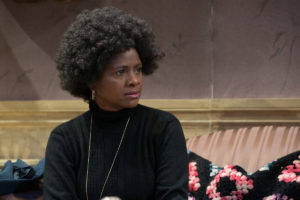
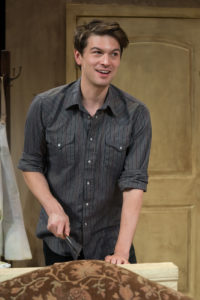

{ 1 comment… read it below or add one }
I’m not quite sure what play you were watching, however you seem to be in the minority in your review of this play.
It is totally opposite than a production emphasizing the “woke” culture; if anything, it mocks it with the granddaughter character. Readers of this review, do yourself a favor, and look at the other reviews of this production.